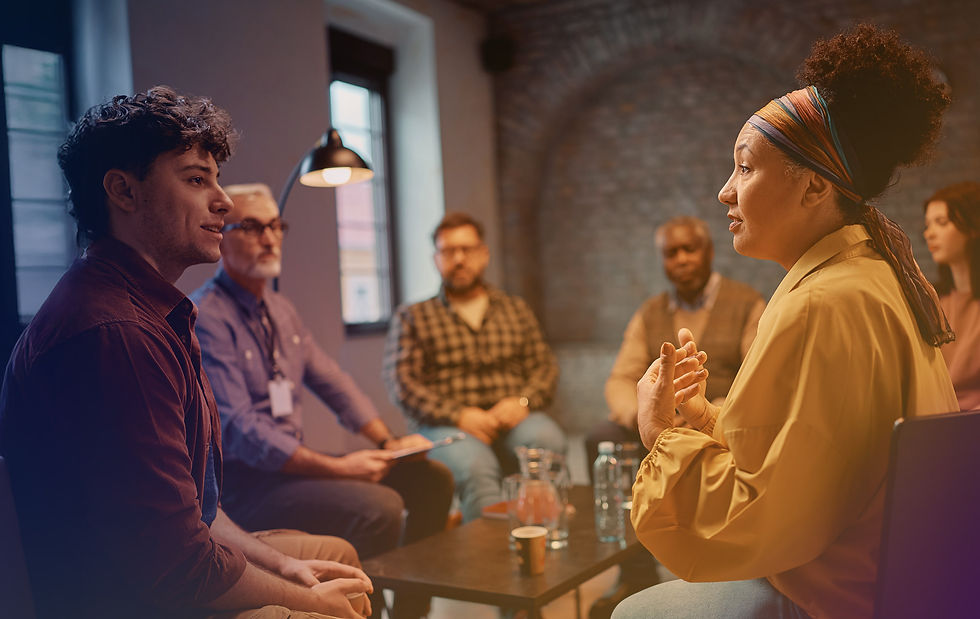Build Skills for Emotional Resilience in Our DBT-Informed Group Therapy in London
- Aug 6, 2025
- 4 min read
Updated: Sep 9, 2025
If you’re struggling with intense emotions, relationship difficulties, or feeling overwhelmed by day-to-day life, group therapy can offer a powerful, supportive space for healing. At Schoen Clinic Chelsea, our DBT-informed skills group helps adults develop practical strategies to manage distress, build emotional regulation, and improve interpersonal effectiveness, all within a structured therapeutic setting.
Led by experienced Psychotherapist Zoe Laxton, the group is part of our broader specialist group therapy offering at our private mental health and wellbeing clinic in London.
“DBT is a fantastic tool and can benefit so many areas of our lives,” says Zoe.
Read on to learn more about the benefits of DBT-informed group therapy, what to expect from sessions, and how to join.

What Is DBT-Informed Group Therapy?
Dialectical Behaviour Therapy (DBT) is an evidence-based psychological treatment originally developed to support individuals with Borderline Personality Disorder (BPD) and chronic emotion dysregulation. Today, it is widely used to support people dealing with a range of mental health conditions, including:
Anxiety disorders
ADHD
Emotional dysregulation
Relationship problems
Self-harming behaviours
DBT-informed group therapy focuses on teaching core coping skills that help individuals navigate emotional distress more effectively, improve relationships, and lead more balanced, mindful lives.
“In the groups, we will work together on a particular skill or two each session,” explains Zoe. “We’ll learn different skills that we can put into practice in the room and also outside the therapy room as well.”
What Skills Will You Learn?
The DBT-informed group at Schoen Clinic Chelsea focuses on four key areas of psychological resilience:
1. Mindfulness
Mindfulness teaches you how to stay present, grounded, and aware of your thoughts and surroundings.
“Mindfulness is about staying grounded and in the present moment and really being connected with what's going on with our surroundings,” Zoe says.
By developing mindfulness skills, group members can start to notice and respond to emotions with greater clarity and calmness rather than reacting impulsively or becoming overwhelmed.
2. Distress Tolerance
These are your “firefighting” skills, useful in moments of high emotional intensity or crisis.
“Perhaps there's been an event that has resulted in you becoming incredibly emotionally aroused, and what we'd need to do is to bring this level of intensity of the emotion down. These skills of distress tolerance are really great for doing that,” Zoe explains.
Distress tolerance techniques help you cope with overwhelming emotions without resorting to unhealthy or harmful behaviours.
3. Emotional Regulation
These skills focus on identifying, naming, and managing emotions more effectively.
“The goal is to not let your emotions control you,” says Zoe. “And that can be really difficult for some people who experience emotions incredibly intensely.”
Participants learn how to increase emotional awareness, reduce vulnerability to emotional shifts, and foster more stable moods over time.
4. Interpersonal Effectiveness
Communication challenges often worsen mental health difficulties. This module helps individuals express their needs clearly, set healthy boundaries, and improve relationship dynamics.
“Perhaps you have difficulty in communicating effectively or getting your needs met,” Zoe says. “Perhaps you have difficulties being able to put in boundaries with other people.”
How Is This Group Different from Individual Therapy?
Group therapy offers the opportunity to learn in a community—with the added benefit of peer support and shared experiences. While individual therapy is highly personalised, group work allows members to see that they are not alone in their struggles.
Zoe notes that many participants combine group therapy with individual sessions for a more comprehensive treatment experience.
“In individual therapy, we will identify specific skills that are applicable to you and your life,” she explains. “Some skills are great for some people, some not so other. It’s about building this personal toolbox of skills to use in your day-to-day life.”
Who Can Benefit from DBT-Informed Skills Groups?
This group is designed for adults who:
Feel overwhelmed by emotions or mood swings
Struggle with anxiety, panic, or emotional sensitivity
Have difficulty managing relationships or setting boundaries
Are recovering from trauma or living with BPD
Want to develop mindfulness, confidence, and emotional resilience
Participants do not need a formal diagnosis to benefit from the group. Many attend because they feel stuck, disconnected, or unable to regulate their emotions effectively.
Meet the Facilitator – Zoe Laxton
Zoe Laxton (MBACP, GMBPsS) is a registered psychotherapist currently completing her Doctorate in Counselling Psychology and Psychotherapy.

Her work is grounded in integrative, person-centred care, drawing from DBT, CBT, psychodynamic and existential therapies.
Zoe has experience supporting individuals with a wide range of challenges including:
Childhood trauma and attachment difficulties
ADHD
Depression and low mood
Relationship issues and emotional overwhelm
“My aim is to help people understand themselves more deeply, manage emotions more effectively, and feel more empowered in their daily lives,” Zoe shares.
Learn more about Zoe Laxton and book a consultation.
How to Join the Group
Our DBT-informed skills group runs weekly at Schoen Clinic Chelsea, located in West London. Sessions are facilitated in a safe, confidential space and designed for adults aged 18 and over.
To explore whether this group is right for you, or for your patients if you're a referring clinician, get in touch with our team or visit our specialist therapy group page below.
Watch the Video
🎥 Hear directly from Zoe Laxton in this short video introduction to the group
At Schoen Clinic Chelsea, we believe therapy should empower individuals with tools they can carry into every aspect of life. Whether you’re living with BPD, navigating trauma, or simply looking for a healthier way to manage stress and emotions, our DBT-informed group offers a structured, supportive path forward.
For more information or to book your initial appointment, contact our team today.



